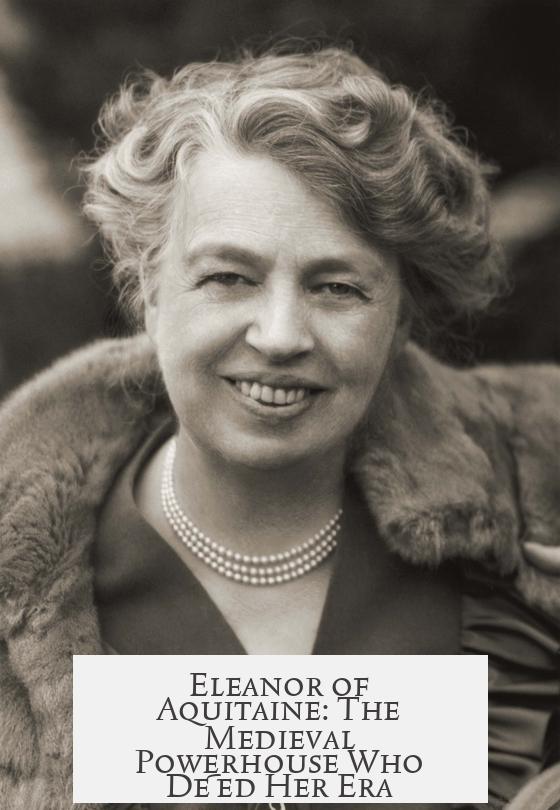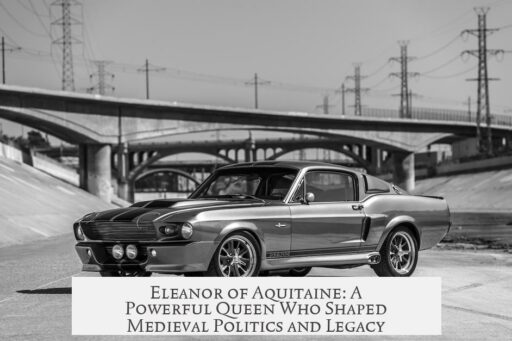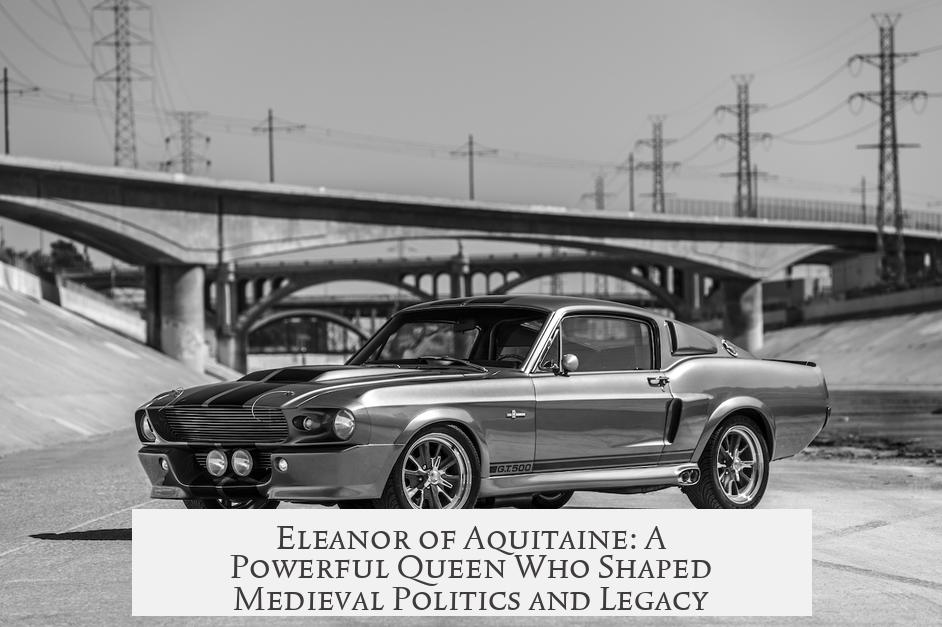Eleanor of Aquitaine builds her reputation as a particularly powerful figure largely through her unique blend of inherited wealth, political savvy, and active participation in governance. She wields influence by managing vast lands, acting as regent, supporting political rebellions, and maintaining authority despite the restrictive norms of her time.
Eleanor inherits Aquitaine, one of medieval Europe’s largest and wealthiest provinces. This inheritance forms the backbone of her power. Aquitaine belongs to her family, not her husbands, so her control over it remains a critical source of authority. Despite being married to powerful kings of France and England, she retains a tangible grip on these lands and finances. This land ownership offers her a platform few women then possessed.
Her political influence grows from seizing opportunities her status affords. Unlike many medieval noblewomen, who appear in historical records mainly as wives and mothers with little personal agency, Eleanor actively shapes events. She obtains a rare divorce from her first husband, King Louis VII of France, which showcases her determination to reclaim autonomy. Later, as queen of England through marriage to Henry II, she nurtures her sons’ rebellion against their father, signaling her political boldness and commitment to family power dynamics.
Eleanor’s role as regent exemplifies her wielding of kingly authority. She governs in Henry II’s absence during the crusade, managing the realm and making decisions normally reserved for men. Queens and noblewomen often acted as regents, but Eleanor’s prominence and decisiveness set her apart. She commands respect from nobles and vassals, reinforcing her power beyond symbolic status.
Several practical factors enable Eleanor’s influence. First, her noble birthright positions her close in age and rank to her husbands and sons, facilitating personal and political trust. Her wealth supplies resources crucial to funding political endeavors and maintaining loyal supporters. Multiple adult sons provide leverage in power struggles, giving her role as matriarch a strategic edge. Her kingship, first as queen of France and then England, lends authority recognized by other rulers.
It is essential to recognize that though Eleanor stands out, queenly power was not unheard of in medieval Europe. Queens often handled estates, steered political decisions, and served as regents or patrons. Women like Yolande of Aragon or Maria de Luna show this, though less documented or famous. The popular image of medieval noblewomen as passive is misleading. Eleanor’s distinction lies partly in how well her life is recorded and dramatized.
This fame leads to her image becoming a subject of myths and legends. Contemporary detractors craft tales accusing her of cruelty or unfaithfulness, reflecting fears about female authority. Over centuries, such stories evolve, coloring her legacy with shades of villainy. However, this notoriety also fuels modern interest, positioning her as a groundbreaking female leader whose story challenges stereotypes. Media portrayals, like Katharine Hepburn’s role in The Lion in Winter, highlight her enduring allure as a powerful medieval woman.
| Elements of Eleanor’s Power | Details |
|---|---|
| Inheritance | Heir to Aquitaine, wealthy and extensive lands |
| Political Actions | Divorced first husband, led sons’ rebellion, acted as regent |
| Regency | Ruled England during Henry II’s crusade |
| Strategic Family Roles | Mother to heirs, securing her political leverage |
Eleanor’s reputation rests on her active role in shaping medieval politics in a male-dominated world. She combines inherited assets with keen political engagement and familial strategy. This mixture allows her to exercise influence effectively, contrasting greatly with common portrayals of passive medieval queens. Her legacy blends respect for her leadership with myths born from societal anxieties about female power.
- Eleanor’s inheritance of Aquitaine provides a rare independent power base.
- Her political acumen enables her to act decisively, including securing a divorce and supporting rebellions.
- She serves as regent, directly governing large realms and exercising kingly authority.
- Her image is complex, mixing respect, fear, and myth, reflecting broader attitudes toward powerful women in history.
Eleanor of Aquitaine: The Medieval Powerhouse Who Defied Her Era

Eleanor of Aquitaine earns her reputation as a powerful figure primarily because she wielded significant political influence in an age when women were largely invisible in governance. She carved out a unique space for herself through her inheritance, sharp political maneuvers, and bold defiance of medieval gender norms.
Let’s unpack what made Eleanor so remarkable and how she managed to hold such sway in a man’s world.
Breaking the Mold: Eleanor’s Reputation as a Power Player
Picture the typical medieval queen. She’s often portrayed as a quiet figure, embroidering quietly in her chamber, with little say in politics or power. Eleanor? She flips that script completely.
- She inherited the vast, wealthy province of Aquitaine in her own right, a rarity in itself. This made her not just a consort but a landholder in her own name.
- Despite multiple attempts by her husbands to control her estates, Eleanor maintained her connection and leadership over Aquitaine throughout her life.
- She boldly divorced her first husband, King Louis VII of France—quite unheard of at the time—demonstrating a fierce independence.
- She supported—and arguably led—her sons in rebellion against her second husband, King Henry II of England.
- Serving as regent multiple times, she wielded royal authority as if she were the monarch herself.
- She even took part in a Crusade, an adventurous feat for any medieval nobleman, let alone a queen.
In many ways, Eleanor embodied a different kind of medieval womanhood—one marked by agency, leadership, and boldness.
How Did She Do It? The Background That Built Her Power
But Eleanor’s strength wasn’t just personal. Her circumstances played a huge role.
- Inherited Wealth and Land: Aquitaine was massive and rich. Her control over this land made her invaluable, politically and financially.
- Strategic Marriages: Her husbands ruled large realms—Louis VII of France and later Henry II of England. Both kingdoms needed strong alliances and partners.
- Close Age to Husbands: Being not much younger than her spouses fostered a more equal footing in their relationships.
- Surviving Sons: Having multiple sons who trusted her solidified her long-term influence. Their loyalty gave her leverage in court politics.
- Queen Status: Being queen gave her publicly recognized authority, access to court, and legitimacy.
These elements created a naturally powerful platform. If Eleanor had been equally talented but lacked these advantages, history might have written a very different story.
Common Misconceptions About Medieval Queens

Modern pop culture loves its stereotypes. The Victorian-era and later depictions of medieval queens mostly emphasize their passivity or beauty rather than their brains or political savvy.
However, many queens consort from medieval Europe were politically active:
- They often acted as regents during their husbands’ absences, managing kingdoms with real authority.
- They provided financial support crucial to political and military campaigns.
- Many managed their own lands and estates, conducting business and legal affairs.
Eleanor stands out mainly because her exploits are well-documented and celebrated—others, like Yolande of Aragon or Maria de Luna, deserve recognition too but remain obscure in popular memory.
Eleanor’s Complex Legacy: From Scandal to Stardom
Interestingly, Eleanor’s boldness earned her enemies—and resulting stories that painted her in a scandalous light.
“Stories of her evil vengeance and alleged adulteries thrived, often exaggerated to support contemporary fears about female power.”
These tales fluctuated depending on the political climate. During the reigns of Elizabeth I and Mary Stuart, cautionary stories of powerful women circulated widely, often using Eleanor as a cautionary example.
Despite this, or perhaps because of it, Eleanor’s image was rehabilitated in modern times. Films like the 1968 The Lion in Winter starring Katharine Hepburn sparked renewed interest, portraying her as a trailblazer rather than a villain.
Why Should We Care About Eleanor Today?
Eleanor of Aquitaine’s story offers more than just medieval gossip. It challenges us to rethink female power in history. How often do we overlook women’s political roles because they don’t fit tidy narratives?
- Her life encourages us to question assumptions about gender and leadership.
- It highlights how access to resources and relationships can shape one’s ability to wield power.
- It reminds us that history often misses or distorts women’s contributions.
Curious if there’s a “modern Eleanor” in your own life? Consider the women who quietly hold influence through subtle channels or those who push boundaries in unexpected ways. Eleanor’s legacy lives on in them.
Practical Lessons From Eleanor’s Political Influence

So, how did Eleanor do it? Here are some takeaways from her life that apply beyond the medieval court:
| Strategy | Eleanor’s Example | Modern Application |
|---|---|---|
| Leverage your assets | Inherited Aquitaine gave her power and wealth. | Identify and maximize your unique resources—skills, networks, capital. |
| Build strong alliances | Her marriages connected powerful kingdoms. | Develop mutually beneficial relationships in business or politics. |
| Use authority when opportunities arise | Served as regent multiple times, exercising royal power. | Step up when leadership roles present themselves. |
| Challenge norms thoughtfully | Divorced to pursue freedom and backed her sons’ rebellion. | Don’t be afraid to disrupt the status quo if it serves a higher goal. |
In summary, Eleanor’s power came from a combination of inherited privilege, personal determination, strategic use of relationships, and timing. She was a queen who did not sit quietly; she led, influenced, and shaped medieval European politics.
Final Thought
Isn’t it fascinating how one woman’s life can ripple through a thousand years of history? Eleanor of Aquitaine proves that power rarely comes from a single source. It’s complex, layered, and often challenged by society. If she can wield influence so effectively centuries ago, just imagine what determined people can achieve today.




